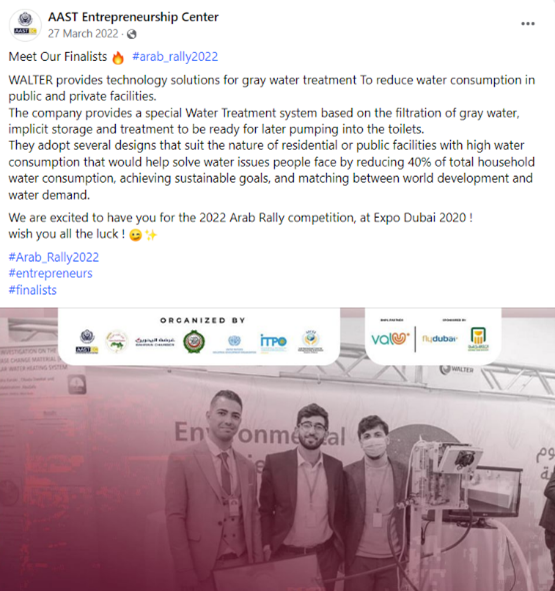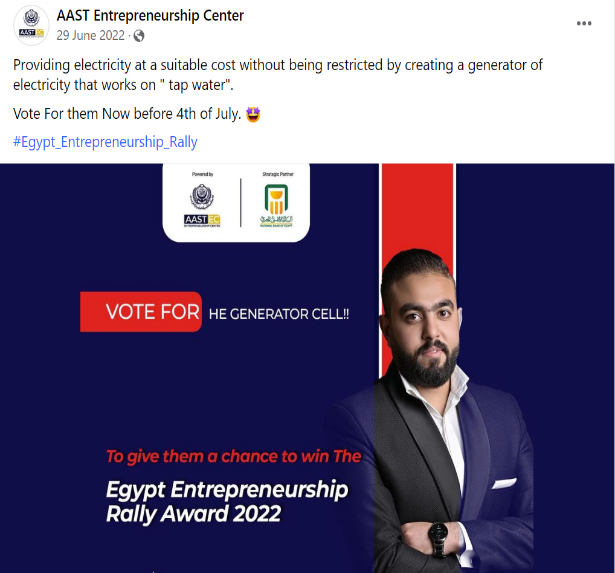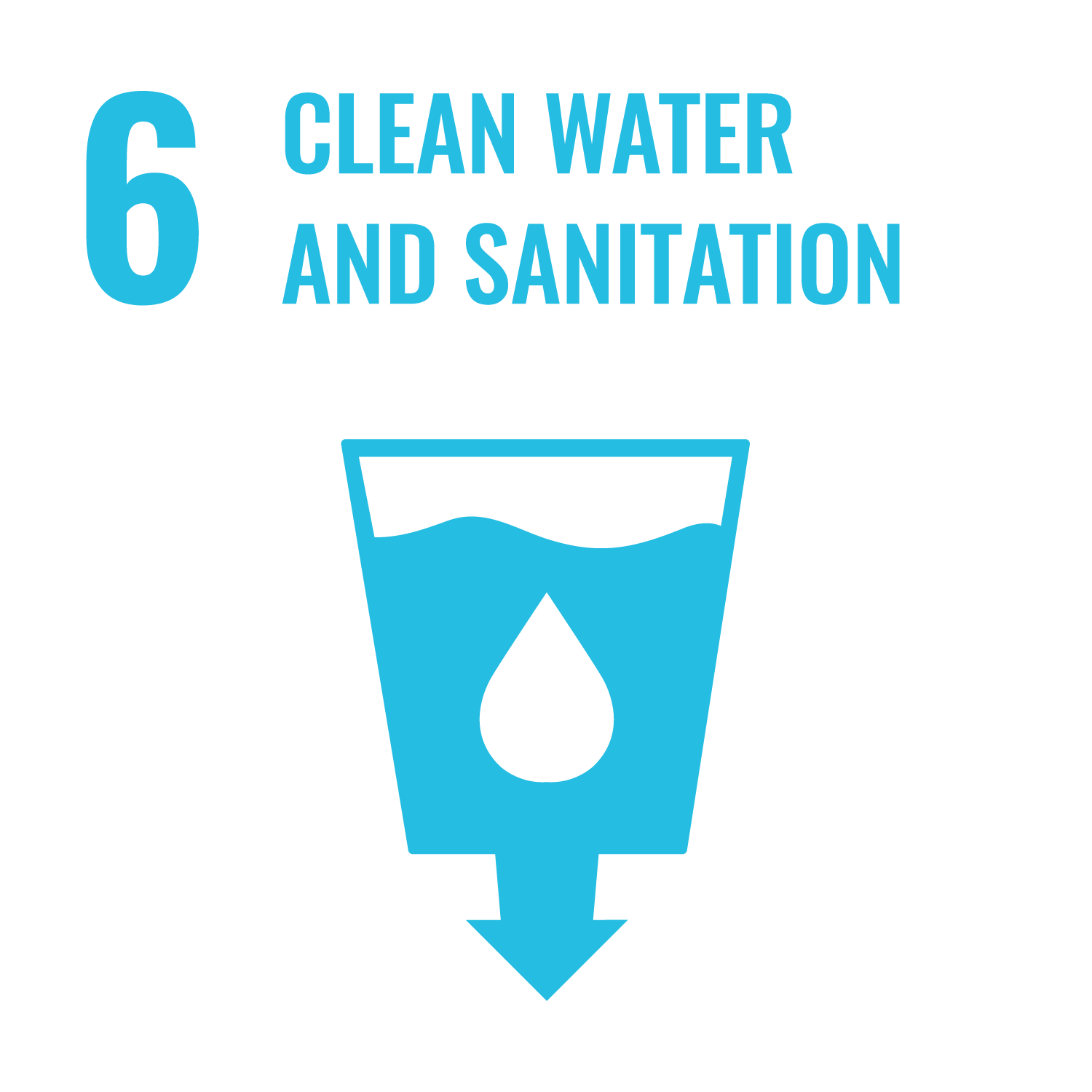 Goal 6. Clean Water and Sanitation
Goal 6. Clean Water and Sanitation
6.5.7 Promoting conscious water usage in the wider community
AASTMT promotes conscious water usage in the wider community through educational workshops, community engagement, and innovative projects. The university organizes programs to raise awareness of water conservation and sustainable practices, targeting students, professionals, and local farmers. Projects like RESILINK and Toumali focus on implementing water-efficient technologies in agriculture and avoiding marine litter, while initiatives such as the Tech-Innovation Challenge encourage the development of innovative solutions for water management using technology.
Campaigns and Training Programs in the Wider Community (2023-2024)
AASTMT Partners in Advancing Clean Water and Sanitation at Alexandria Conference
Governor Mohamed El-Sherif and Deputy Minister of Housing Dr. Sayed Ismail inaugurated the Conference on Sustainability of the National Water and Wastewater Industry in Alexandria, with the participation of the EU Delegation, the Holding Company for Drinking Water and Wastewater, Alexandria Sanitation Company, AASTMT, and private sector partners. The conference highlighted Egypt’s efforts to advance water management, wastewater treatment, desalination, sanitation services, and stormwater management in line with SDG 6 and Egypt Vision 2030. Key achievements presented included:
- Expanding desalination plants from 80,000 m³/day in 2014 to 1.44 million m³/day, with a long-term plan of 8.9 million m³/day by 2050.
- Increasing wastewater treatment capacity from 8 million m³/day to 18.8 million m³/day using advanced secondary and tertiary treatment technologies.
- Promoting reuse of treated wastewater for irrigation, reducing water losses through smart meters, and enhancing community awareness.
- Investing in human capacity building and technical training to ensure sustainability of services.
- The event emphasized the importance of localizing water and sanitation technologies, enhancing pollution control, and encouraging private sector participation to achieve sustainable, resilient services for citizens.
AASTMT Partners in Advancing Clean Water and Sanitation at Alexandria Conference
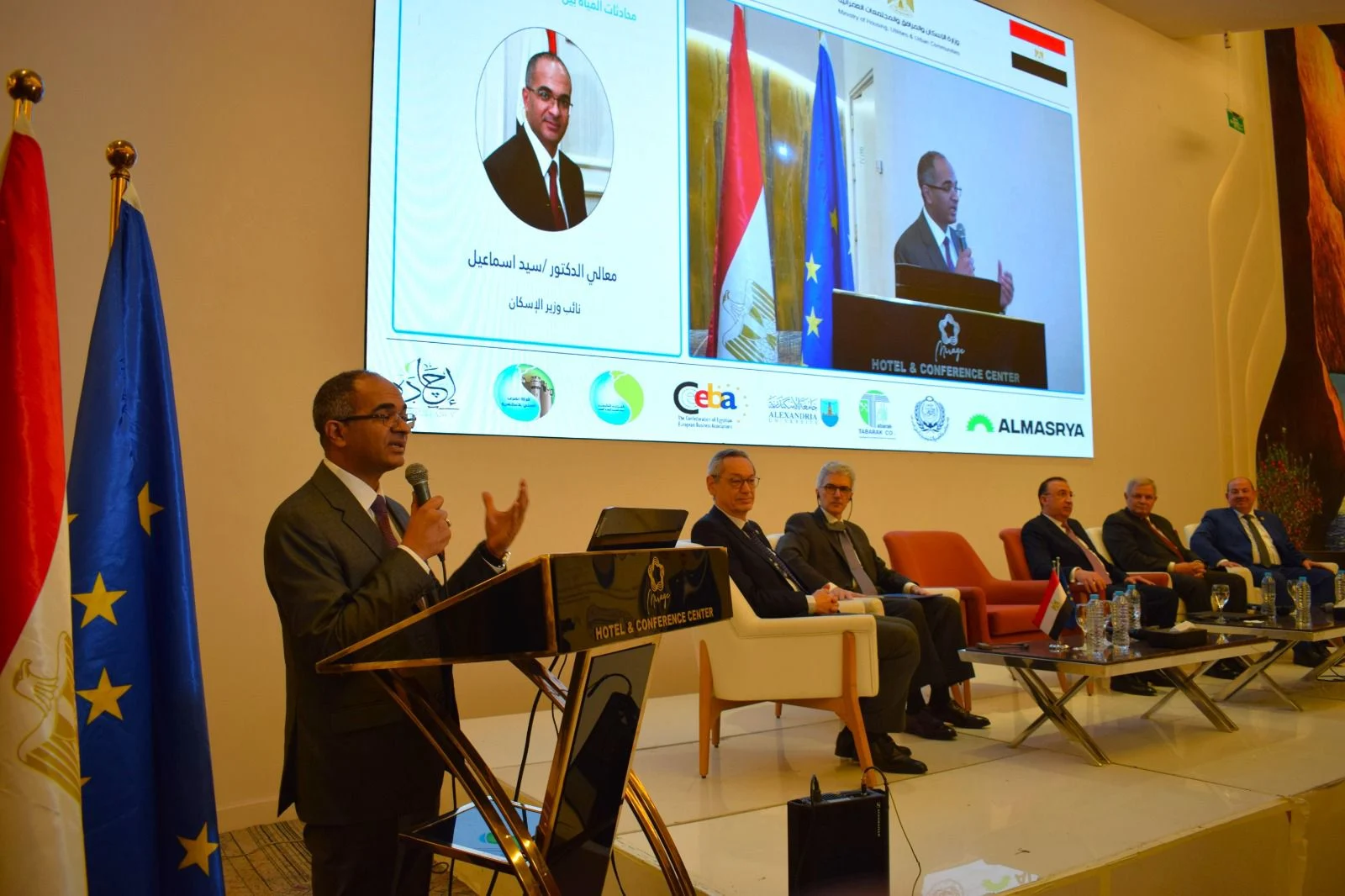
Tech Innovation Challenge: Empowering Youth to Develop AI Solutions for Sustainable Development (2021- present)
The Tech-Innovation Challenge is an annual initiative empowering student to design projects that address global challenges in line with the UN SDGs. Hosted by AASTMT and has been on for the third round as an initiative to promote conscious water usage among young generations through technology. It is an initiative where students from schools and universities develop Artificial Intelligence (AI) applications to address challenges across sectors such as health, agriculture, education, and traffic. This initiative aligns with the Sustainable Development Goals (SDGs) by encouraging young minds to innovate solutions that tackle real-world problems.
- 2022: Students from schools and universities presented projects in renewable energy, health, agriculture, and environmental sustainability.
- 2023: The challenge expanded, highlighting innovations in climate action, clean energy, sustainable agriculture, and education technologies.
- 2024: Held at Smart Village with 90 teams and 380 students, focusing on solutions for health, agriculture, education, environment, and sustainability.
Tech Innovation Challenge: Empowering Youth to Develop AI Solutions for Sustainable Development (2021- Present) on AASTMT webpage

Update for “Towards a Green Sustainable Future” Initiative (2022- 2024)
The "Toward a Green and Sustainable Future School Initiative" was launched by AASTMT, as an initiative, which began in September 2022, aiming to raise awareness about the Sustainable Development Goals (SDGs) among students and teachers in Alexandria. The initiative included three key phases:
- 2022 Awareness Phase: Educating students and teachers about the SDGs
- 2023 Exchange Visits: Mutual visits between the Academy and participating schools, both in-person and virtually.
- 2024 Competition Phase: Students developed and presented innovative projects, culminating in a competition.
On Wednesday, November 15, 2023, as part of the AAST’s “Toward a Green and Sustainable Future School Initiative”, the closure of the event took place in presence of environmental experts to promote sustainable water management, sanitation, and environmental education in schools. Keynote speaker emphasized the role of schools as living labs for water saving, rainwater harvesting, wastewater treatment, and safe reuse of effluents for irrigation—critical responses to Egypt’s water scarcity and groundwater contamination challenges. A panel discussion highlighted integrating topics like drinking water safety, sewage treatment, constructed wetlands, water pollution, and risks from arsenic and fluoride in contaminated groundwater into school curricula. Emphasis was placed on hygiene, sanitary facilities, and protecting water resources from point and non-point source pollution. The day ended with a school visit showcasing student projects on activated sludge systems, solar disinfection, greywater recycling, and sustainable irrigation—demonstrating practical solutions for water productivity, ecosystem restoration, and resilient water supply.
Towards a Green Sustainable Futire Finals Competition on AASTMT webpage

UPDATES RESILINK Increasing Resilience of Smallholders with Multi-Platforms Linking Localized Resource Sharing (2021-2026)
The RESILINK Project is a PRIMA Section II funded project, that enhances smallholder resilience by strengthening local agri-food value chains and reducing dependence on distant resources. Through IoT, AI, and decision-support systems, it enables real-time resource management and adaptive supply chains. A digital resource platform will connect farmers to nearby suppliers and services using mobile and open-source tools, ensuring accessibility and sustainability. Using a Living-Lab approach, RESILINK will pilot and refine its technologies to boost adoption, while ensuring interoperability with other agri-food platforms. The project promotes efficient water use, sustainable agriculture, and digital innovation, supporting SDG 6 (Clean Water and Sanitation) and SDG 12 (Responsible Consumption and Production).
2022: Project launched under PRIMA to promote sustainable water management and resilient agri-food systems. Built partnerships to enhance efficient resource use and local water governance.
2023: Developed prototype digital tools for real-time water monitoring and resource sharing. Promoted water-smart agriculture using IoT and AI technologies.
2024: Released RESILINK mobile app and digital platform for sustainable irrigation and waste-water reuse. Began Living-Lab pilots to improve water efficiency and climate resilience among smallholders. Many training sessions took place for farmers and stakeholders.
RESILINK project

Update Prevention of Tourism Marine Litter "Toumali" Project (2021-2025)
The Toumali Project, supported by UNIDO and the Government of Germany, focuses on implementing sustainable waste management practices within the tourism sector to protect marine ecosystems. By addressing the pollution caused by improper waste disposal, the project aligns with SDG 6, particularly in improving water quality and reducing contamination of water bodies.
TouMaLi Project Milestones (2021–2024)
- 2021: Project launched with preliminary site visits in Tunisia, Egypt, and Morocco. First beach-monitoring campaign conducted in Tunisia.
- 2022: Steering Committee meetings held (May & Nov) to define cooperation and review progress. Baseline data collection and continued beach monitoring in all pilot areas.
- 2023: Pilot operations launched in selected coastal zones, including Hammam Sousse. Development of legal and institutional frameworks for sustainable waste management in the tourism sector.
- 2024: Training programs implemented for local actors in marine litter management and beach monitoring. Expansion of waste-reduction solutions in tourism hot spots, reinforcing SDG 6 and SDG 14.
TouMaLi Project Milestones (2021–2024)
TouMaLi Project Milestones (2021–2024) on AASTMT webpage
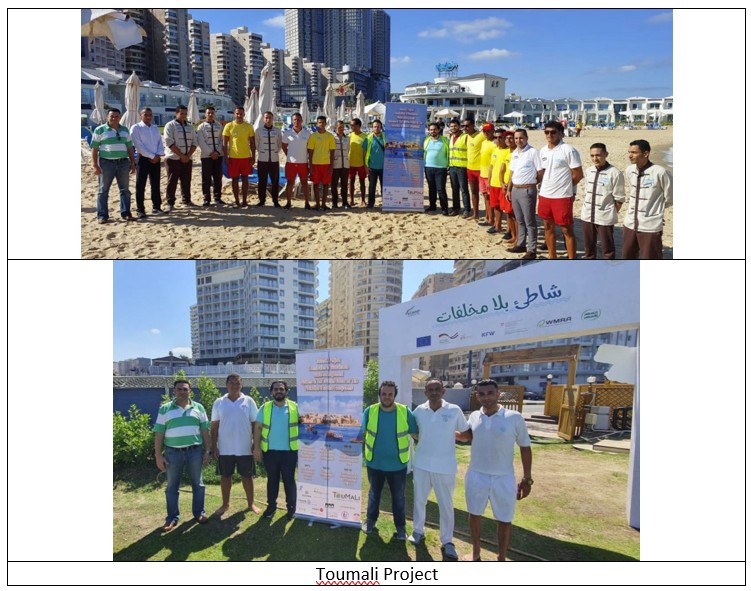
AAST Supports startups in the domain of clean water, sanitation and sustainable agriculture
AASTMT spin-offs are innovative companies established through the university’s Entrepreneurship Center to transform research outcomes and student projects into real-world solutions. These spin-offs reflect AASTMT’s strong commitment to fostering innovation, entrepreneurship, and sustainable development by linking academic research with market needs. Through its incubators and startup programs, the Academy supports emerging entrepreneurs in developing products and services across various fields — from renewable energy and water management to marine technologies and smart agriculture — contributing to Egypt’s knowledge economy and advancing several UN Sustainable Development Goals, particularly SDG 9 and SDG 6.
AAST Supports Startups in the Domain of Clean Water, Sanitation and Sustainable Agriculture on AASTMT webpage
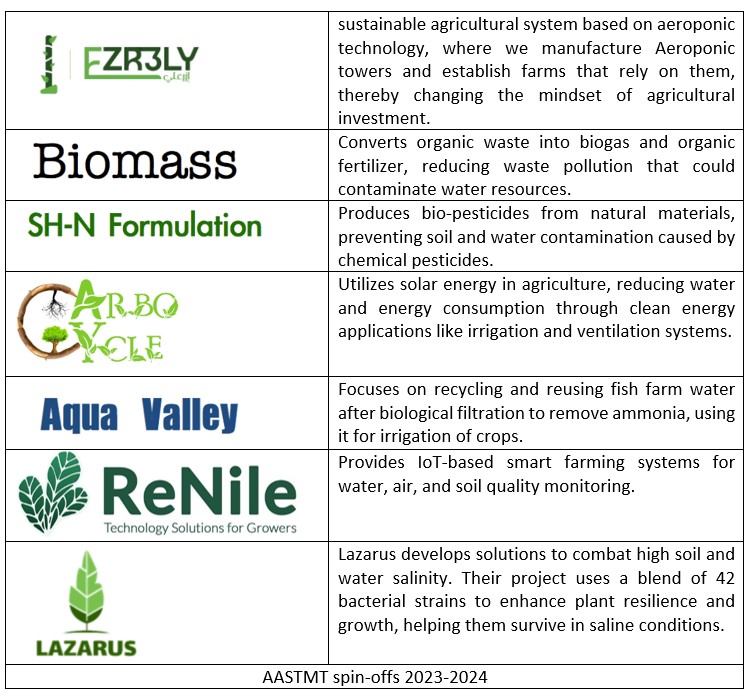
AASTMT Promotes Conscious Water Management through PRIMA Info Day 2024
In support of SDG 6 – Clean Water and Sanitation, the Arab Academy for Science, Technology and Maritime Transport (AASTMT) organized the PRIMA Annual Work Plan 2024 Info Day on February 14, 2024, to encourage research and innovation in sustainable water management. The event, led by Dr. Mohamed Wageh and Dr. Omar Elammary, highlighted the role of science and technology in advancing efficient water use, resource conservation, and ecosystem protection. Supported by the European Union’s PRIMA Programme, the initiative fosters collaboration among academia, industry, and policymakers to promote integrated and responsible water management in Egypt and the Mediterranean region.
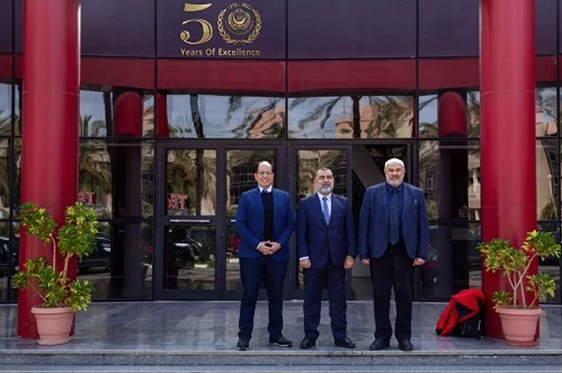
2022-2023
Update for “Towards a Green Sustainable Future” Intitaive (2022- Present)
The "Toward a Green and Sustainable Future School Initiative" was launched by AASTMT, as an initiative, which began in September 2022, aiming to raise awareness about the Sustainable Development Goals (SDGs) among students and teachers in Alexandria. The initiative included three key phases:
- Awareness Phase: Educating students and teachers about the SDGs.
- Exchange Visits: Mutual visits between the Academy and participating schools, both in-person and virtually.
https://aast.edu/en/news/news-details.php?language=1&unit_id=1206&news_id=486101540&event_type_id=1
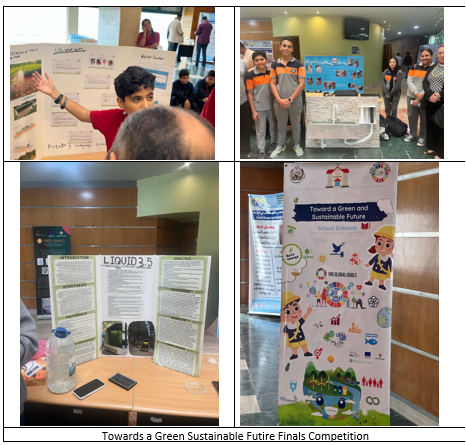
Ministry of Planning Organizes a Workshop for Students of the AASTMT
The Ministry of Planning and Economic Development organized a workshop for students from the AASTMT, focusing on key topics related to sustainable development and the SDGs. The workshop was attended by senior figures including Dr. Ahmed Kamali, Deputy Minister, and Dr. Tarek Abdin, Dean of the College of Management and Technology at AASTMT. The workshop aimed to bridge academic knowledge with real-world applications, highlighting the importance of sustainable development, digital transformation, and entrepreneurship. Discussions included Egypt's efforts towards achieving SDG 6 (Clean Water and Sanitation) and other goals, emphasizing the importance of ensuring water quality and efficient water management through innovative projects like the Smart Green Projects initiative.
https://www.almasryalyoum.com/news/details/2751332
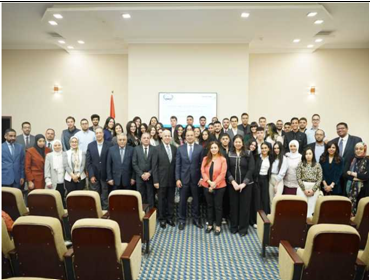
AASTMT Hosts Youth Forum 2022: Empowering Climate Awareness and Sustainable Solutions
The Community Support Center of Caritas Damietta participated in the Youth Forum 2022, which was hosted by the Arab Academy for Science, Technology, and Maritime Transport (AASTMT) in Alexandria. The forum brought together young people to raise awareness about the risks of climate change and their role in addressing it. The event covered several key topics, including:
- Climate migration
- Sustainable fashion
- Innovative projects
Participants were divided into workshops based on their areas of interest, discussing these themes in depth. This event aligns with various Sustainable Development Goals (SDGs), particularly SDG 13 (Climate Action) and SDG 6 (Clean Water and Sanitation). Discussions on climate change, especially the impact on water resources, emphasized the need for sustainable water management and pollution prevention, key elements of SDG 6.
https://aast.edu/en/sdg/news-details.php?language=1&view=1&unit_id=1206&news_id=486103389&event_type_id=1
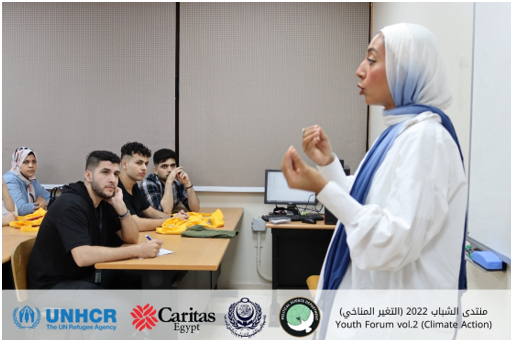
Update UNI-GREEN Project:
The UNI-GREEN Project, in collaboration with AASTMT, promotes conscious water usage by empowering youth and engaging multiple stakeholders in addressing climate change challenges, including water management. This project focuses on raising awareness, advocating for sustainable practices, and providing technical and financial support for youth-led entrepreneurial solutions. By targeting key issues such as water conservation and pollution prevention, the project encourages practical approaches to water security and sustainability. AASTMT plays a key role by organizing training programs, workshops, and community outreach initiatives that emphasize water conservation in daily life, especially in agriculture. The project not only educates students and professionals but also actively engages farmers and local stakeholders in implementing water-efficient technologies, contributing to the broader goals of SDG 6 (Clean Water and Sanitation). Through this collaborative approach, UNI-GREEN and AASTMT encourage a culture of responsible water usage, benefitting both urban and rural communities.

RESILINK Increasing Resilience of Smallholders with Multi-Platforms Linking Localized Resource Sharing (2021-present)
The RESILINK Project, in collaboration with AAST, plays a vital role in promoting conscious water usage within the wider community by enhancing the resilience of small-scale farmers. The project focuses on developing localized resource-sharing platforms that optimize the use of natural resources, including water management. By leveraging cutting-edge digital technologies, such as IoT and AI, RESILINK ensures efficient water usage in agriculture, which is essential for water conservation and the sustainable management of water resources.This initiative fosters the creation of smart agri-food systems that integrate real-time information exchange about resources like water. By connecting smallholder farmers to supply chains and e-commerce platforms, RESILINK helps reduce water waste and improve water use efficiency, directly supporting SDG 6 (Clean Water and Sanitation). Through this, AAST contributes to building a more resilient community that practices sustainable water management.
RESILINK project
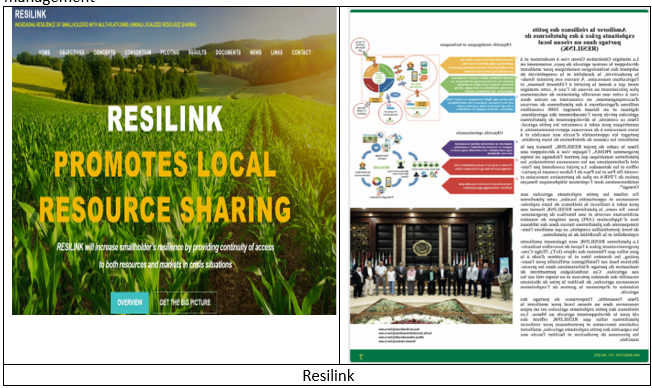
Update Prevention of Tourism Marine Litter "Toumali" Project (2021-2025)
The Toumali Project, supported by UNIDO and the Government of Germany, focuses on implementing sustainable waste management practices within the tourism sector to protect marine ecosystems. By addressing the pollution caused by improper waste disposal, the project aligns with SDG 6, particularly in improving water quality and reducing contamination of water bodies. AASTMT plays a key role in the project by leveraging its expertise and resources to promote sustainable tourism practices and develop innovative solutions for waste reduction. Through awareness campaigns, training programs, and collaboration with local stakeholders, AASTMT ensures that tourism activities in coastal regions are aligned with the preservation of water resources and environmental sustainability, thus contributing to the protection of clean water and healthy ecosystems.
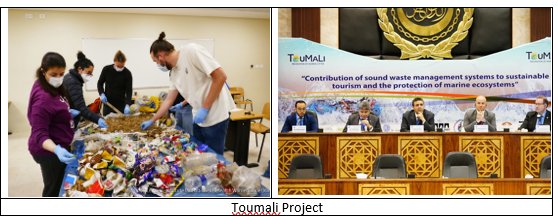
2021-2022
Tech Innovation Challenge: Empowering Youth to Develop AI Solutions for Sustainable Development (2021- present)
The Tech-Innovation Challenge hosted by AASTMT has been on for the second round as an initiative to promote conscious water usage among young generations through technology. It is an initiative where students from schools and universities develop Artificial Intelligence (AI) applications to address challenges across sectors such as health, agriculture, education, and traffic. This initiative aligns with the Sustainable Development Goals (SDGs) by encouraging young minds to innovate solutions that tackle real-world problems. The competition specifically supports SDG 6 (Clean Water and Sanitation) by encouraging the development of AI solutions that can improve water management, reduce water waste, and address water pollution. By integrating AI into sustainable practices, participants can create technological solutions that enhance water conservation and promote clean water access, which is essential for achieving SDG 6. Moreover, it fosters awareness about the global importance of efficient water use in different sectors, thus contributing to a broader understanding and action towards sustainability.
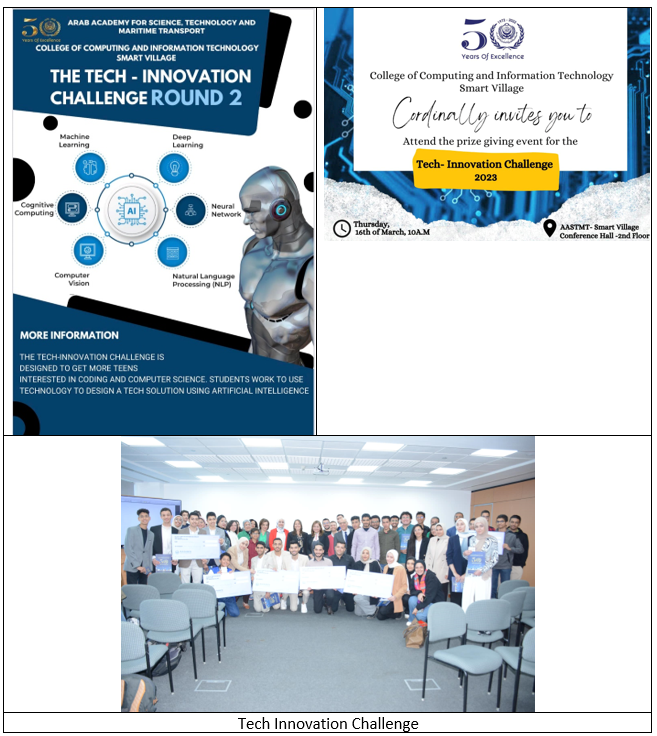
Promoting Sustainable Development Goals through External Engagement at the Industrial Technical Secondary School for Water Supply and Sanitation in Alexandria (2021- present)
Under the supervision of Mr. Jaber Mustafa, the school's principal, the school had the honor of receiving a visit from a committee representing the School's Cooperation Protocol with the Arab Academy for Science, Technology, and Maritime Transport. The purpose of the visit was to develop the school in the field of sustainable development, with a focus on energy conservation. The committee expressed their admiration for the school, its students, and the modern educational facilities. They were accompanied by several engineers from the company to exchange experiences regarding electricity consumption reduction, as the school is known for its expertise in water conservation among leading schools.
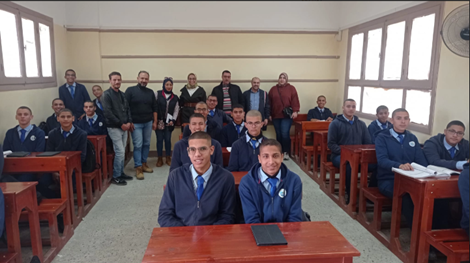
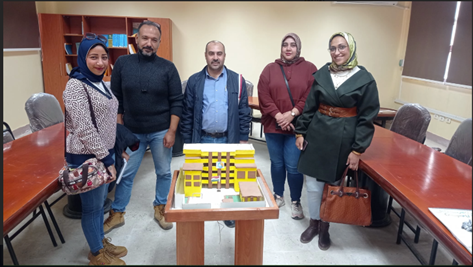
Visit of Construction and Building Engineering Department to Local Farmers in Sharkeya Governorate to Raise Awarness of SDGs (2021- present)
Professor Dr. Mohamed El Sayed Meshaly, along with a group of students from the Faculty of Engineering and Technology at the Arab Academy for Science, Technology, and Maritime Transport in Port Said, undertook a mission to connect with and support the local community in Izbat Rushdy village, Fakous, Ash Sharqia Governorate. Their goal was to understand the challenges faced by local farmers and address their issues. The team provided the community with Moringa plants, known for their pharmaceutical benefits, and offered guidance on planting and care. They also supplied organic plant pots produced on campus, promising to buy rice, eggs, and other organic vegetables from the local farmers and assist in marketing their products within the community. This initiative reflects the academy's commitment to social responsibility and community engagement.
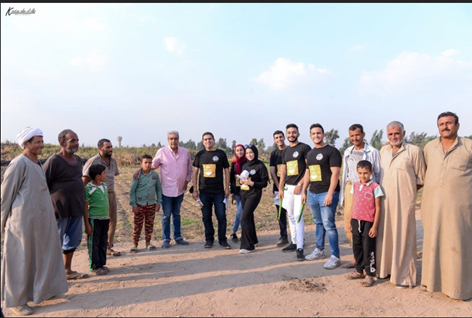
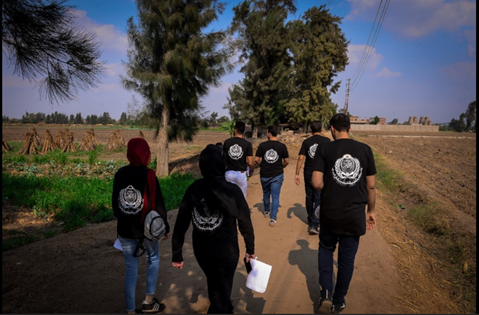
University-Industry Integration Forum (2022- Present)
Dr. Eman Gamal El-Din Morsi, the College's Vice Dean for Training and Community Service, participated in the First University-Industry Integration Forum at Port Said University's Faculty of Engineering, which occurred on November 22, 2022. The event, under the patronage of the Governor of Port Said, Major General Adel El-Ghadban, and in the presence of the President of Port Said University, Professor Dr. Ayman Ibrahim, focused on research projects related to coastal protection, desalination, renewable energy, and artificial intelligence. The discussions resulted in outcomes such as enhanced collaboration in research projects and proposals for specialized workshops in fields like water desalination, energy, petroleum, and gas. The university is poised to serve as a consultancy center for addressing industrial issues by utilizing solutions from master's and doctoral theses and linking them to industry applications. Additionally, industry professionals are invited to attend the 23rd Water Technology Conference (Water Desalination and Treatment) scheduled for March 2023 in Port Said, serving as a platform for industry experts, university professors, and decision-makers to converge.
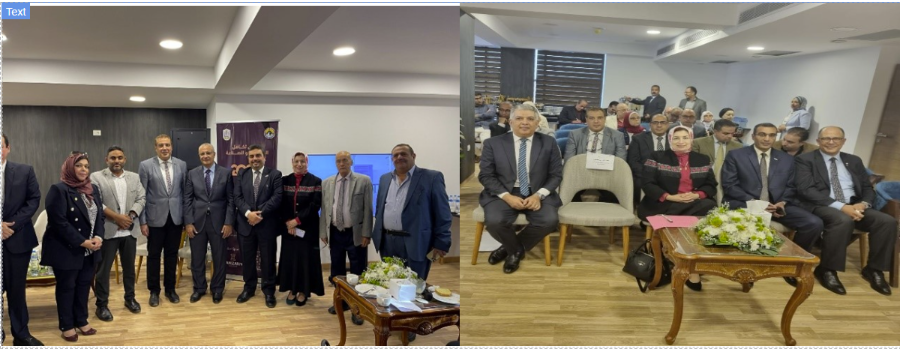
“Towards a Green Sustainable Future” (2022- Present)
The Committee for the implementation of Sustainable Development Goals (SDGs) at the Arab Academy for Science, Technology and Maritime Transport (AASTMT) has launched an initiative to educate teachers and school students at different levels of the development of the SDGs set by the United Nations. This is within the framework of the Academy's social responsibility and its positive impact on the surrounding environment. This initiative can be summarized in three main stages:
- Addressing 7 schools in Alexandria as a first stage this year to join training workshops for teachers and students to raise awareness of the SDGs.
- Following up with the schools on the implementation of what has been learned in the workshops at the school level and supporting these schools financially and logistically to implement initiatives to save energy and water as a first stage.
- Holding a competition among these schools at the Academy's headquarters in order to identify the schools that succeeded first in developing their institutional performance after implementing the SDGs and presenting success stories in each.
The initiative includes several axes and goals for sustainable development and aims to implement them in the schools participating in the initiative and with the participation of more than one group of society. First, the initiative improves the quality of education in schools, introduces smart component and supports the application of students’ ideas. Secondly, the ideas proposed and developed by the participating schools include water and energy fields, which are included in SDG 6 and SDG 7. Third, the initiative works on these two axes and applies them as this will have a great impact on reducing the risks of climate change and achieving sustainability in participating cities and communities, which is in line with SDG 11 and Goal 13. Finally, participation in cooperation between the AASTMT and various schools and institutions contributes to achieving and developing partnership with them and is directly related to SDG 17. Details of the initiative can be found Towards a Green Sustainable Future
initiative towards a green and sustainable future on AASTMT page
First Meeting and Event Launching
On Tuesday, September 13, 2022, the initiative "Towards a Green and Sustainable Future" was launched by the Dean of Scientific Research and Innovation at the Academy, under the leadership of Professor Dr. Yasser Jaber Al-Dasuqi, along with the Sustainable Development Team. The event took place at the Faculty of Engineering and Technology at AASTMT, hosted by the Dean, Professor Dr. Akram Suleiman Al-Salmi. The initiative aims to enhance the role of the academy in raising awareness, contributing to community development, and fostering collaboration between the academy and schools to educate students and educational institutions about sustainable development goals. More than 70 individuals, including students and representatives from seven different schools, attended the day's events, along with the presence of Engineer Jueda Ali Suleiman, Vice President of the Alexandria Water Company, and Engineer Nahal Abdul Aziz Amar, Project Engineer at the Alexandria Water Company.
First Meeting and Event Launching on AASTMT webpage
School Visits:
As the collaboration between local schools and the AAST continues. The SDG “Towards a Green Sustainable Future” conducted several visits (physically and virtually) to local schools and witnessed the students’ science projects and spread awareness about sustainable development goals. The schools included 7 visits and the visit ended with an explanation of the upcoming competition.
Towards a Green Sustainable Future" initiative School Visit to Nile School on AASTMT page
Towards a Green Sustainable Future" initiative School Visit to EAS on AASTMT page
Towards a Green Sustainable Future" initiative School Visit to HIS on AASTMT page
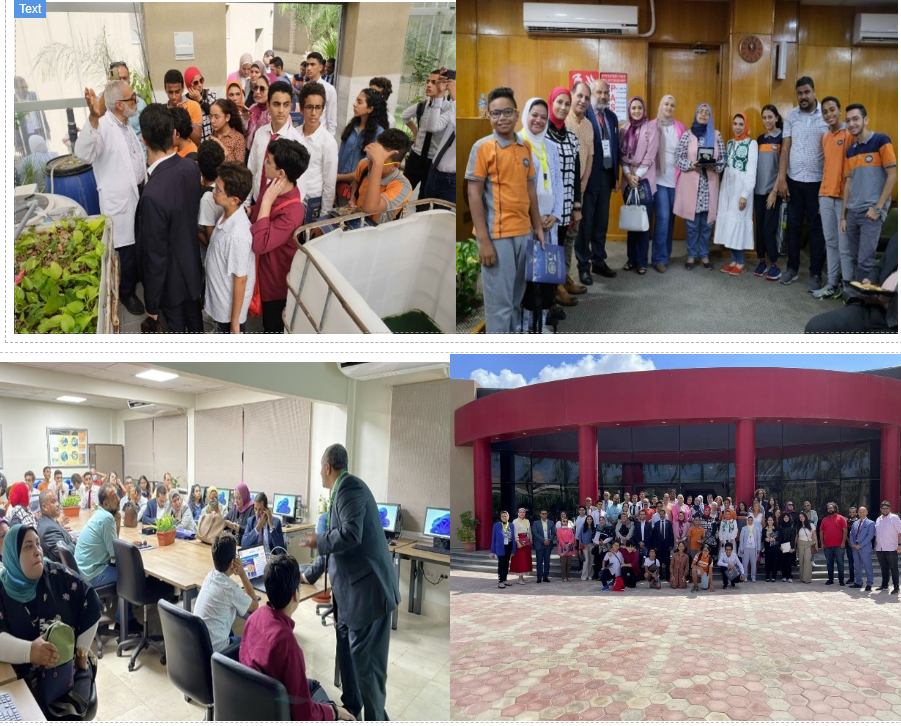
"Engineers for a Sustainable Egypt (2021-present) (2021)
“Engineers for Sustainable Egypt” initiative started in 2021 promoting all SDG goals, training for faculty members. Specialized training courses offered by the “Engineers for Sustainable Egypt” initiative to the Business Information Systems Department - Smart Village - AASTMT, began in light of the directives of His Excellency the President of the Academy, Prof. Dr. Ismail Abdel Ghaffar Ismail Farag, organized and coordinated by A.M.D. Ahmed Al-Sadawi, Deputy Education Officer, Head of the Business Information Systems Department - Smart Village, and member of the Scientific Advisory Council for the initiative.
The training aims to spread the culture of sustainable development, exchange experiences in the fields of sustainable development, qualify specialized cadres, and qualify certified trainees in the field of sustainable development, within the framework of cooperation between the initiative and the department, which will continue to conduct practical training workshops for students of the department and college on defining and applying the goals of sustainable development, in line with the state’s vision. Egyptian 2030.
"Engineers for a Sustainable Egypt" Initiative on AASTMT page
Energy and Petrolum Logistics Management Deoartment in Alexandria "Ambassadors for Sustainable Development"
"Engineers for a Sustainable Egypt" initiative extended and collaborated with the Department of Energy and Petroleum Logistics Management, to conduct free training courses for one-week duration. Accredited trainers, endorsed by the Ministry of Planning and Economic Development, and representatives of the "Be an Ambassador" initiative, educated participants about sustainable development over five days. The training included the following topics: (Introduction to sustainable development and its goals - sustainable finance - digital transformation - governance and its impact on achieving sustainable development goals - optimal use of water - sustainable cities - sustainable transport and its relationship to climate action - waste recycling - effective communication skills)
"Ambassador for Sustainable Development" event on AASTMT webpage
“Engineers for Sustainable Egypt” College of Engineering & Technology, Alexandria
Participation in the Advisory Council of the AASTMT to discuss the challenges of training in the Fifth Industrial Revolution.
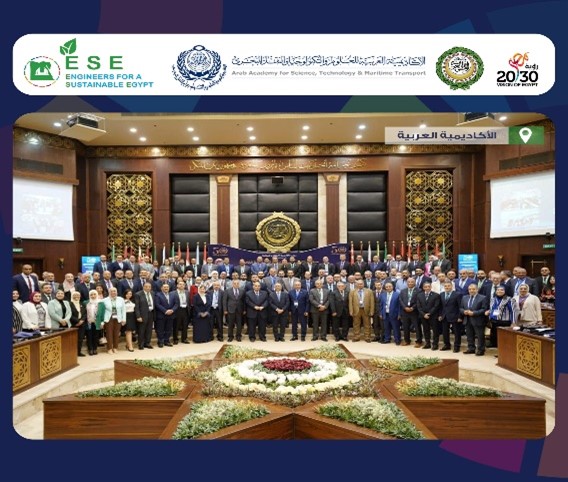
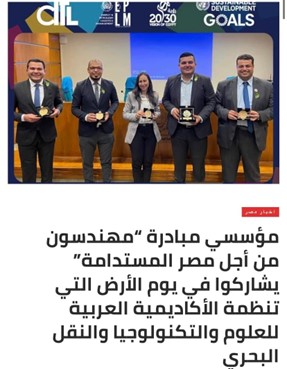
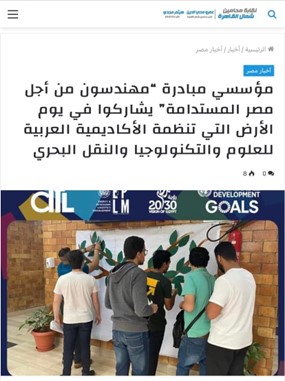
Spinoffs: (2021)
The Spinoffs initiative was first created in 2020 and new companies were directly created from the research and program at EC-AASTMT. The initiative primarily targets all SDG goals such as SDG 1, SDG 2, SGD 6, SDG7, SDG 9, SDG 11, SDG 12, and SDG 13. Defined as register companies set up to exploit intellectual property that has originated from EC-AASTMT. AAST supported number of university spin offs from either from the youth incubator – Rally competition, where an advisory board headed by AAST president formed for this reason. The Target is to have “256 “startups in the next two years, till 2023. AAST EC launched the Youth incubator to support university startups. Also AAST has a TICO office, Technology Innovation Commercialization Office, that support in having spinoffs and startups.
70 agricultural startups with two agribusiness development incubators on al Bawabah news paper
EC-AASTMT Spin-Offs on AASTMT Entrepreneurship Center webpage
EC-AASTMT Spin-Offs 2021-2022 on AASTMT webpage:
70 Emerging Agricultural Companies in "Tanmeya Wa Tatweer" Incubator on AASTMT webpage
"Tanmeya Wa Tatweer" Winners
